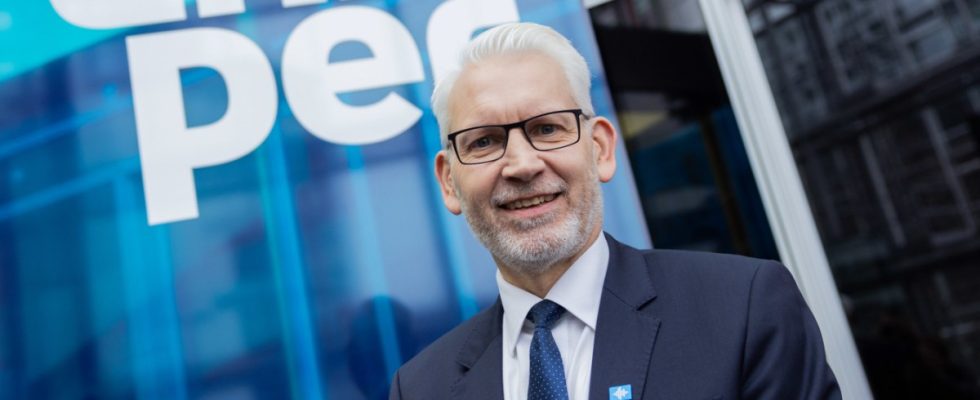It’s dizzying: the electricity and gas company Uniper posted a breathtaking loss of 19.1 billion euros in 2022; Germany’s largest gas importer had to be rescued with state money. But in 2023, the Düsseldorf company achieved the highest profit in the company’s history at 6.3 billion euros. This is also an outlier; in the coming years, profits will be significantly more moderate, as CEO Michael “Mike” Lewis explained on Wednesday at the balance sheet presentation in Düsseldorf. “This normalization is good, we want to leave the time of extreme swings behind us,” said the Brit, who has led Uniper since last summer.
It still doesn’t get boring at Uniper. The former Eon manager Lewis, who speaks German very well, has to quickly make the company pretty for privatization. The federal government has owned more than 99 percent of the shares since the rescue operation, but this share must shrink to a good 25 percent by 2028. The EU Commission has that made a conditionwhen she approved state aid. In order to become attractive to investors, the group with its 7,000 employees needs a sustainable business model. Lewis therefore wants to invest massively in wind and solar parks as well as in hydrogen-capable gas power plants: The near-bankrupt Uniper, which has so far been a dirt-slinger, is to become a model green company.
That would be a complete transformation, because Uniper was created when Eon spun off its climate-damaging coal and gas power plants and gas trading business in 2016. This dirty residue of Eon ultimately became the undoing of the gas trade – and its great dependence on Russian imports. Uniper supplies more than 1,000 municipal utilities and industrial companies with natural gas. When Gazprom cut exports, the Düsseldorf-based company had to buy the missing quantities expensively on the markets in order to fulfill the long-term supply contracts. Therefore, the company accumulated huge losses. A bankruptcy would have put Uniper’s customers, such as the municipal utilities, in trouble. That’s why the state took over Uniper at the end of 2022. The government provided 13.5 billion euros in capital plus loans from the KfW development bank.
Uniper has now been able to repay the loans, and the group has already set aside 2.2 billion euros to transfer to the government at the beginning of 2025. The EU Commission demands that the company pay back capital if it turns out that the state aid was too generous. And this is probably the case, as the high profits for 2023 show.
The federal government owns nuclear power plants
An important reason for the positive development is that gas prices fell unexpectedly quickly. Uniper was therefore able to fulfill long-term supply contracts more cheaply than expected. The group’s responsible trading division posted an adjusted operating profit before interest and taxes of a good four billion euros last year, after a dramatic loss of eleven billion euros in 2022. But the power plant division also earned well, with operating profit tripling year-on-year to 2, 3 billion euros.
The company operates hard coal and gas power plants in Germany, the Netherlands and Great Britain. The group also has hydroelectric power plants in Germany and Sweden and even nuclear power plants in Sweden. Curious consequence: Thanks to Uniper, the federal government is the owner of Swedish nuclear reactors a year after the last German nuclear power plants were shut down.
Uniper wants to take the climate-damaging coal-fired power plants offline by 2029. In Germany it will end even earlier. The EU Commission is demanding that Uniper sell investments and power plants in return for state aid. Some things have already been sold, but the modern Datteln 4 coal-fired power plant in North Rhine-Westphalia is still on the list. To achieve this, CEO Lewis must find an interested party by the end of 2026 – after which Uniper would no longer burn coal in Germany. However, a lawsuit could complicate the sale. Opponents of the power plant complain that the development plan for Datteln 4 was incorrect. The state’s higher administrative court must decide on this.
In the end, the state should sell at a profit
For the current year, Uniper’s management expects an operating result of only 1.5 to 2 billion euros; the bottom line is that a maximum of 1.1 billion euros should remain as profit. The reason for the comparatively more modest results is that electricity and gas prices have fallen. In addition, the profit in 2023 was boosted by a special effect: the surprisingly cheap processing of old gas supply contracts.
CEO Lewis, 56, wants to invest the profits in green growth. He wants to spend eight billion euros on this by 2030. A decision will soon be made as to whether Uniper will expensively repair the Happurg pumped storage power plant in Middle Franconia and put it back into operation. This has been switched off since 2011. Uniper also wants to build wind and solar parks and produce hydrogen in a climate-friendly manner in so-called electrolysers. The group also wants to import, store and trade this energy source – in the long term it should replace the natural gas business.
However, a large part of the investments should flow into hydrogen-capable gas power plants. They are supposed to step in when wind and solar parks cannot feed in enough electricity. The federal government wants to subsidize the construction; This is what the power plant strategy that has just been presented provides for. The fact that this concept is finally available after several delays is “very important for Germany and for Uniper,” said Lewis.
It is also important for the finance minister to recoup as much of the 13.5 billion euros in state aid as possible in the event of privatization, such as an IPO. Lewis is confident about that. Most recently, he said that it could well be that the federal government “will end up getting more money than it invested in Uniper as equity.”

